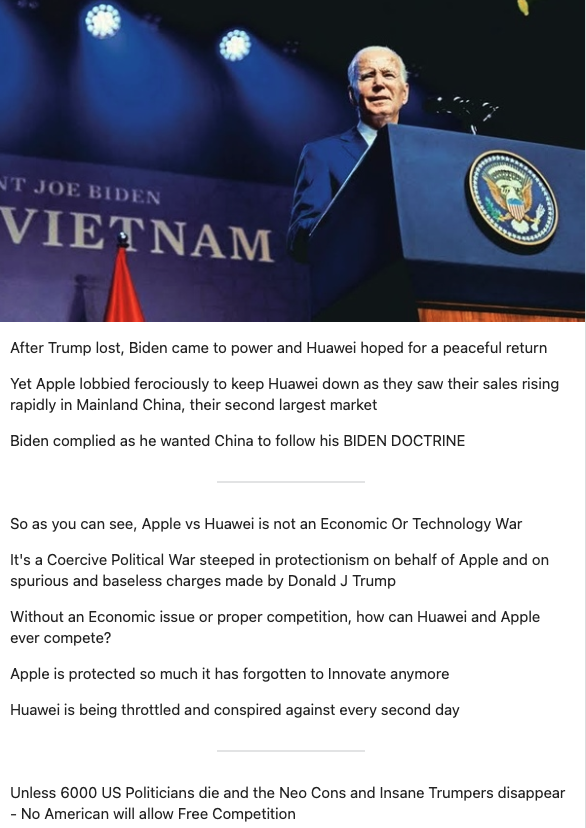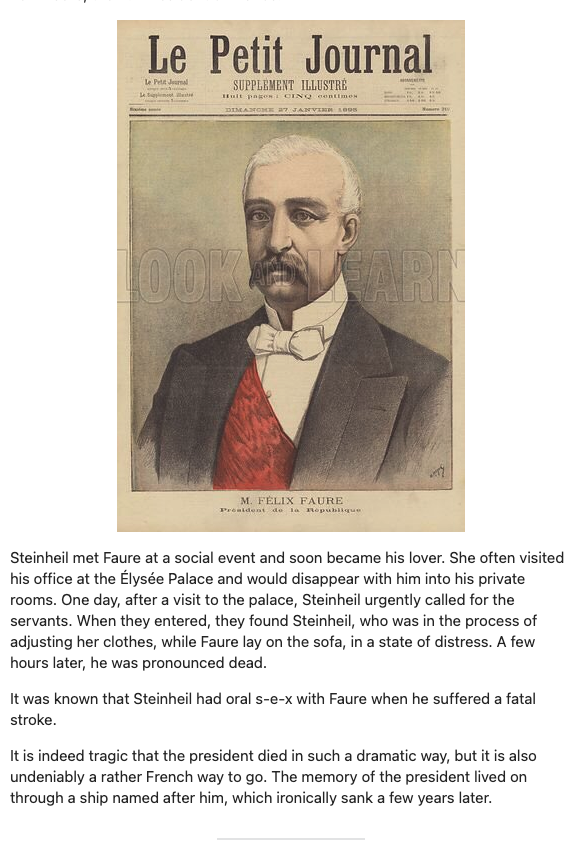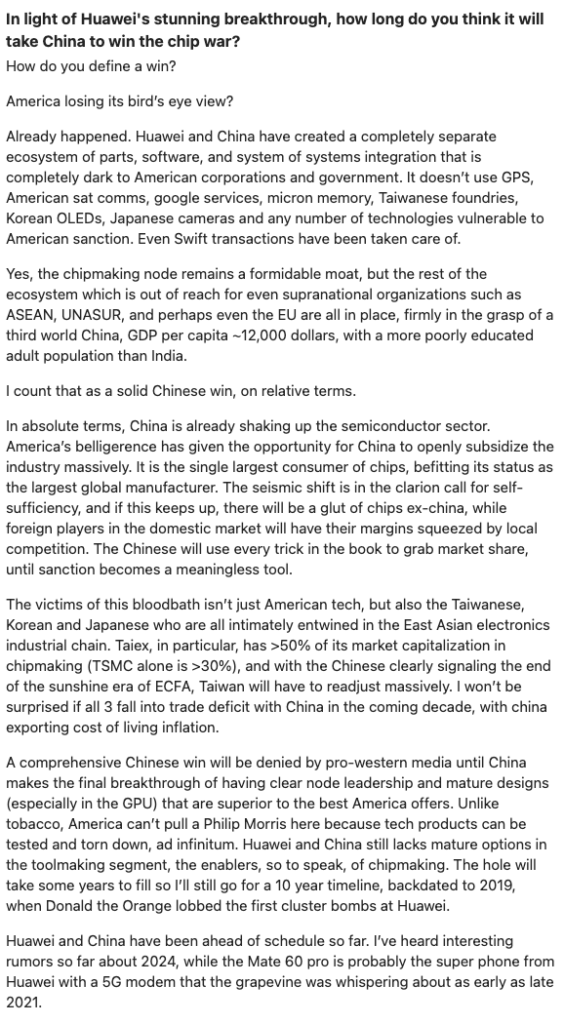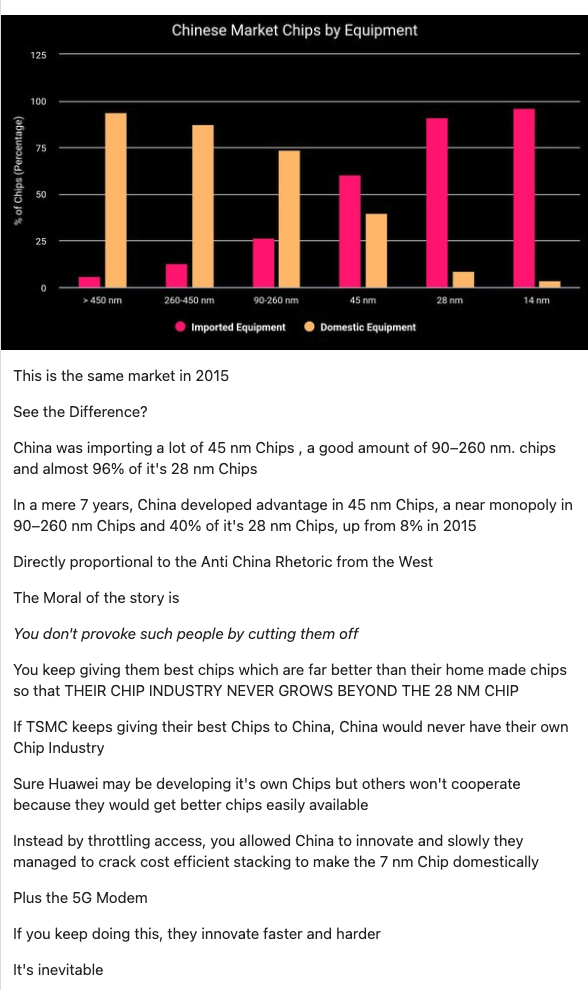-
Subject – Verb
examples:
A dog (subj) plays (verb).
subj – We use ‘A dog’ to refer to a non-specific dog. We use ‘the dog’ to mean a specific dog. This is to clarify the subject reference.
verb – the verb ‘play’ must have an s, because our subj is 3rd singular.The cat (subj) runs (verb).
subj – We must say ‘A cat’ to refer to any, non-specific cat. We use ‘the cat’ to mean a specific cat.
verb – the verb ‘run’ stays in base form because our subj IS NOT 3rd singular.People play.
subj – ‘people’ is plural, so we use the word to represent ‘in general’.
verb – the verb ‘play’ is in base form because subj IS NOT 3rd singular.Boys fight.
subj – ‘Boys’ is plural, so we use the word to represent ‘in general’.
verb – the verb ‘fight’ is in base form because subj IS NOT 3rd singular.The plane flies.
subj – ‘plane’ is 3rd singular. We use ‘The’ plane to clarify that it is a specific plane.
verb – the verb ‘fly’ must add ‘ies’, because our subj is 3rd singular.The competition begins.
subj – competition is singular, so we use ‘the/a’ to clarify subject reference as explained above.
verb – the verb ‘begin’ must add ‘s’ because our subject is 3rd singular.China grows.
subj – China is a specific place with a name, just like a person. So it is singular.
verb – the verb ‘grow’ must add ‘s’ because our subject is 3rd singular. -
Subject – Verb (action) – Object
Subject – who or what performs the action of the verb.
Verb – expresses an action.
Object – whoever or whatever receives that actionRicky plays volleyball.
Subject – Ricky
Verb – plays (we add ‘s’ because subj is 3rd singular)
Object – volleyballMy mom made spaghetti.
Subject – My mom
Verb – made (past tense)
Object – spaghettiI eat beef.
Subject – I
Verb – eat (present tense: eat is ok in base form)
Object – beefHe rides a bike.
Subject – He
Verb – rides (present tense: ride + ‘s’ because subj is 3rd singular)
Object – a bikeThe girl sits on the couch.
Subject – The girl
Verb – sits on (present tense: sit + ‘s’ because subj is 3rd singular)
Object – the couch -
Subject + verb (action) + adverbs
examples
I played terribly
subj – I, verb – played, adverb – terriblyHe sang beautifully.
subj – He, verb – sang, adverb – beautifullyShe stood motionlessly.
subj – She, verb – stood, adverb – motionlesslyShe undressed quickly.
subj – She, verb – undressed, adverb – quicklyI performed remarkably.
subj – I verb – stay adv – remarkablyThe girl shouted excitedly.
subj – The girl verb – shouted adverb – excitedlyShe dances beautifully.
subj – She verb – dances adverb – beautifullyI howled triumphantly.
subj – I verb – howled adverb – triumphantlyWe drive crazily.
subj – We verb – drive adverb – crazilyThe soldier dies miserably.
subj – soldier verb – dies adverb – miserablyMy cat waits impatiently.
subj – My cat verb – waits adverb – impatiently -
Linking verb – used to describe the subject. (non-action)
- is/am/was/will be (singular), are/were/will be(plural)
- appear
- sound
- feel
- smell
- become
- look (linking and action)
- seems
Subject + linking verb (“is/am/are/was/were/will be”) + Subject Complement (noun or adjective)
Ricky is a teacher.
Subject – Ricky, linking verb – is, sub complement (noun) – teacherYou are a monster!
subject – You, linking verb – are, sub complement (noun) – a monsterI am pretty.
subject – I, linking verb – am, sub complement (adj) – prettyShe was a boy.
subject – She, linking verb – was, sub complement (noun) – a boyShe will be a doctor.
subject – She, linking verb – will be, sub complement (noun) – a doctorYou are terrible!
subject – You, linking verb – are, sub complement (adj) – terrible -
Subject + linking verb (‘sense’ – look/smell/seem/become) + subj complement (noun/adjective)
linking verb
object- The family hears a burglar.
- I smell trouble.
- The world becomes a desert.
-
Subject + verb + adverb + adjective
She snores too loud.
subj – She, verb – snores, adverb – too, adjective – loudI am really tired.
subj – I, verb – am, adverb – really, adjective – tiredShe is really pretty.
subj – She, verb – is, adverb – really, adjective – prettyXiao Fei is very tall.
subj – Xiao Fei, verb – is, adverb – very, adjective – tallThe show is really exciting.
subj – The show, verb – is, adverb – really, adjective – excitingThe lake is quite beautiful.
subj – lake, verb – is, adverb – quite, adjective – beautifulMy dog is incredibly happy.
subj – dog, verb – is, adverb – incredibly, adjective – happyWe will be slightly late.
subj – We, verb – will, be adverb – slightly, adjective – late -
Subject + helping verb + main verb + object
helping verb
main verbPresent Perfect – Subj + [have/has (helping verb)] + Past Participle (main verb)
I have eaten squid.
The turtle has eaten bugs since he was little.
My friend has bought a new car.
I have lived in LA for most of my life.Present Continuous – Subj + to be [am, is, are] + present participle (main verb)
helping verb
main verbI am playing video games.
Ricky is correcting homework.
My mom is cooking dinner.
We are fixing the car.Can – ability
I can speak three languages.
I can play three sports.
She can juggle. -
Subject + listed stative ’emotion’ feelings verb + (infinitive as object) + object complement
stative feeling verb – hate, like, love, want, hope, prefer, wish, hope, desire, need
stative thought verb – agree, remember, forgetOther verbs to use with infinitives:
agree: She agreed [to give].
ask*: I asked him [to leave].
decide: We decided [to go].
help*: He helped [to clean].
plan: She plans [to ]
hope: I hope [to pass].
learn: They learn how [to sing].
want*: I want [to come].
promise: I promise [to go].Note most stative ’emotion’ verbs work, but not all:
I need [to know]. √
I desire [to win]. √
I love [to play]. √
I like [to know]. √
I hate [to go]. √
I adore [to …] (X)
I prefer [to eat]. √
We care [to …] (X)
I mind [to …] (X)
I want [to be]. √
I appreciate [to…] (X)
I need [to eat]. √
I wish [to donate]. √
I hope [to win]. √
I value [to…] (X)I forgot [to clean].
subj – I, verb – forgot, object – to cleanI will remember [to fight]
subj – I, verb – remember, object – to fightLet’s agree [to disagree].
subj – Let’s, verb – agree, object – to disagree.Let’s agree [to work].
subj – Let’s, verb – agree, object – to work objectI desire [to win].
subj – I, verb – desire, object – to win.I prefer [to be].
subj – I, verb – prefer, object – to beI want [to play].
subj – I, verb – want, object – to play
She wants [to eat].
subj – She, verb – want, object – to eat
I hope [to win].
subj – I, verb – hope, object – to win
The elders need [to rest].
subj – elders, verb – need, object – to rest
-
Subject + helping verb + adjective + (infinitive as object) + object complement
I am reluctant(adj) [to quit].
subject – I
helping verb – am
adj – reluctant,
infinitive (acting as object) – to quitThey are happy (adj) [to live].
subject – We
helping verb – are
adj – happy
infinitive (acting as object) – to liveI am unable (adj) [to help].
subject – I
helping verb – am
adj – unable
infinitive (acting as object) – to help -
Subject + [am/have/has/is] + (object) + [infinitive as adjective]
She is the girl (obj) [to marry].
subject – She, verb – is, obj – girl,
infinitive (acting as adjective to describe ‘girl’. ) – to marryEnglish 101 is the class (obj) [to take].
subject – English 101, verb – is, obj – class,
infinitive (acting as adjective to describe ‘class’. ) – to takeHe has a joke (obj) [to tell].
subject – He, verb – has, obj – joke,
infinitive (acting as adjective to describe ‘joke’. ) – to tellWe have a job (obj) [to do].
subject – We, verb – have, obj – a job,
infinitive (acting as adjective to describe ‘job’. ) – to doI have a wedding (obj) [to attend].
subject – I, verb – have, obj – a wedding,
infinitive (acting as adjective to describe ‘wedding’) – to attendThat is the team(obj) to beat.
subject – That, verb – is, obj – team,
infinitive (acting as adjective to describe ‘team’) – to beat -
Subject + (action verb) + object + [infinitive as adverb] + complement
Do the ‘in order’ test.
I (earn) money [to live].
test: I earn money ‘in order’ [to live]. √
I (bought) a book [to read].
test: I bought a book ‘in order’ [to read]. √
I (ordered) a burger [to eat].
test: I ordered a burger ‘in order’ to eat. √
Category: My Past
lessons I’ve learned from my past
Oct 14 – Essay about my family
corrections
blah blah
subject + verb + direct object + object complement
ref – https://www.grammarly.com/blog/object-complement/
object complement – An object complement is a word or group of words that describes or renames the direct object of the verb in a way that is essential to complete the meaning of the sentence.
Here are a few more sentences that show the subject + verb + direct object + object complement syntax:
I (subj) find (verb) the food (direct object) [at that restaurant inconsistent in quality].
Paz’s face (subj) turned (verb) the color of a tomato(dir object) [when she realized her mistake].
I(sub) now pronounce(verb) you(direct obj) [married].
The kids (subj) all got(verb) their ears (dir obj) [pierced on the same day].
Adam’s sore ankle(subj) made(verb) his subway commute(dir obj) [an ordeal].
subject + verb + direct object + adverb
Object complements vs. predicate adverbs
The third kind of direct object sentence to look out for follows this pattern: subject + verb + direct object + adverb.
Muaz (subj) composes (verb) his photography (dir obj) beautifully (adverb).
Muaz (subj) develops (verb) his photography (dir obj) [in a darkroom] (adverb phrase).
These sentences are still about Muaz and his photography, but the presence of an adverb or adverb phrase in the predicate (beautifully), in a darkroom — tells us that now we’re talking about how and where Muaz carries out the actions that go into the creation of his photography, rather than how he defines it.
Adverbs modify verbs (beautifully — modifies –> composes)
object complements describe or name direct objects. (‘in a dark room’ — describe –> photography)
Indirect Object – subject + verb + indirect object + direct object
Object complements vs. indirect objects
Another common sentence pattern is subject + verb + indirect object + direct object. Here’s an example:
Muaz (subj) showed (verb) us (indirect obj) his photography (direct obj).
Muaz is the subject,
showed is the verb,
and photography is the direct object.
The indirect object — the recipient of the direct object by way of the action of the verb — is the pronoun us.
Now compare that to this sentence using an object complement:
Muaz (subj) considers (verb) photography (direct obj) [his main art form] (noun phrase).
Here, the subject (Muaz)
and the direct object (photography) haven’t changed,
but the verb considers
and the noun phrase his main art form, clue us in that this is about rounding out our understanding of what Muaz’s photography is rather than describing how he shares it with others.
An indirect object typically receives a direct object, while an object complement describes or names it.
Indirect Object
Indirect objects are a grammatical component in English that typically receive the direct object of a verb. In simpler terms, the indirect object indicates to whom or for whom the action of the verb is performed. It often answers the questions “to whom?” or “for whom?” regarding the direct object.
Structure:
A sentence with an indirect object generally includes a subject, a verb, a direct object, and the indirect object. The typical order is: Subject + Verb + Indirect Object + Direct Object.
Key Points:
Not always necessary: Not all verbs require an indirect object.
Positioning: The indirect object can appear between the verb and the direct object, or it can follow a preposition like “to” or “for”.
Directly following the verb:
Example: “She gave her friend a gift.”
Subject: She
Verb: gave
Indirect Object: her friend (to whom she gave the gift)
Direct Object: a gift (what she gave)
Using a preposition:
Example: “She gave a gift to her friend.”
Here, “to her friend” serves as a prepositional phrase indicating the indirect object.
The structure changes since the indirect object now follows the direct object.
Another Example: “I made my brother a sandwich.”
Subject: I
Verb: made
Indirect Object: my brother (to whom I made the sandwich)
Direct Object: a sandwich (what I made)
Using a preposition: “I made a sandwich for my brother.”
The meaning remains the same, with “for my brother” indicating to whom the sandwich was made.
More Examples
“The teacher taught the students a lesson.”
Indirect Object: the students
Direct Object: a lesson
“They sent their grandparents a postcard.”
Indirect Object: their grandparents
Direct Object: a postcard
“He told her a story.”
Indirect Object: her
Direct Object: a story
Summary
In summary, indirect objects in English sentences help clarify to whom the action is directed. While they can be positioned immediately after the verb or introduced by prepositions like “to” or “for,” understanding their role can enhance clarity in communication.
Using infinitives with Indirect objects
Infinitives can be used with indirect objects in sentences where the infinitive acts as the main verb, and the indirect object typically receives the action of the verb. Here are three examples:
I want him to help me.
In this sentence, “to help” is the infinitive. The indirect object “him” is the one receiving the action of the helping.
She asked them to join the meeting.
Here, “to join” is the infinitive. The indirect object “them” is the group being asked to join the meeting.
We told her to call us.
In this example, “to call” is the infinitive. The indirect object “her” refers to the person being told to make the call.
In each of these examples, the structure presents an infinitive that involves an indirect object receiving the action implied by the infinitive.
Gerunds + Indirect Objects
Gerunds can function as nouns in sentences and can take direct and indirect objects. When a gerund is used with an indirect object, it usually indicates to whom or for whom the action of the gerund is done.
I gave my friend a chance (to practice singing).
Here, “practicing singing” is a gerund phrase, and “my friend” is the indirect object receiving the “chance.”
She offered her brother a chance (to cook dinner).
Here, “playing games” is a gerund phrase, and “their children” is the indirect object that benefits from the “more time.”
In these examples, the gerunds are functioning as nouns that describe the action given or offered related to the indirect object.
Prepositional Phrase + Indirect objects
Sure! Here are five examples of sentences that contain indirect objects used with prepositional phrases:
She gave the book to her friend.
(Indirect object: her friend; prepositional phrase: to her friend)
The teacher explained the lesson to the students.
(Indirect object: the students; prepositional phrase: to the students)
He sent a letter to his parents.
(Indirect object: his parents; prepositional phrase: to his parents)
They offered help to the neighbors.
(Indirect object: the neighbors; prepositional phrase: to the neighbors)
I made a cake for my sister.
(Indirect object: my sister; prepositional phrase: for my sister)
In each of these examples, the indirect object is receiving the action of the verb, while the prepositional phrase provides additional information about the recipient.
Rabbit and Turtle (Alice)
你的句子
我的解释
我的修改和建议
A turtle lives in the forest. His name is Ted. √
A rabbit also live in the forest.
rabbit is 3rd singular, verb must use s. live –> lives
A rabbit also lives in the forest
or
A rabbit named Judy lives in the same forest.
His name is Judy.
Judy is a female name, so we must use pronoun “Her”
Her name is Judy.
Judy thinks he run fast.
Judy thinks she runs fast.
or
Judy believes she runs really fast.
or
Judy believes she is the fastest runner in the forest.
or
Judy is confident that she is the fastest animal around.
He say to ted. Let us run and to see who is the winner.
Remember that say is a verb. He is a 3rd singular, which means our verb ‘say’ must add an ‘s’.
and ‘to’ see – the ‘to infinitive’ is used incorrectly here. Please review ‘to infinitive’.
One day, she challenges Ted to a race.
Judy shouts, “Hey Ted! Let’s race to see who is the fastest!”.
Ted agree with him.
Again, 3rd singular must add ‘s’ to the verb.
Also let’s use adverbs to put more meaning to our sentences.
Ted reluctantly agrees.
At beginning Judy run very fast.
‘At preposition’ is used for places.
If you want to say during when the race begins, you should say “In the beginning”.
In the beginning, Judy runs very fast.
or
On a sunny day, all the animals gather around the start line and the race begins. Judy zooms off into the distance.
Ted runs slow.
This look an elementary student wrote it.
Unfortunately, Ted moves step by step and is really slow.
Judy back to see Ted .
This is NOT how you use the verb ‘back’. Please review verb ‘back’.
Judy turns her head and notices that Ted is nowhere to be seen.
He is very happy and prond of himself.
Be aware of your spelling.
As a result, she is happy and proud of herself.
He thinks Ted will not catch up him .
Please review “prepositional ‘to'”
Please review “be able to” and its usage.
She thinks Ted will not be able to catch up to him.
or
There is no way Ted will catch up.
So he slept a while .
Remember, we are using present tense only. No past tense please.
So she decides to take a nap
But Ted still keeps running .
We do not need extra preposition ‘still’.
But Ted keeps running.
or
Ted persists and keeps moving.
or
Ted perseveres and inches forward.
Finally Ted catch up Judy .
Finally, Ted catches up to Judy and sees her napping by a tree.
Become the winner .
Run on sentence. Also please do not have any space(s) between the last letter and the period.
Ted crosses the finish line and wins the race.
This story tells us. We can not look down other people.
Please review period (.) It means to end the sentence.
This story teaches us that we cannot overestimate others.
or
This fable instills humbleness and perseverance.
If we insist on and make the effort .we will be successful
If we insist on hard work and persistence, we will be successful.
8 parts of speech in the English Language
There are eight parts of speech in the English language:
- nouns
- pronouns
- verbs
- adverbs
- adjectives
- prepositions
- conjunctions
- interjections
The thing about these eight parts of speech in English is that they contain smaller categories of types of words and phrases in the English language. Articles are considered a type of determiner, which is a type of adjective.
How to debug Next JS apps
ref – https://www.youtube.com/watch?v=YzTWKenM5P0
In your root directory of your project, Click on the debug button in the navigation bar.
Click create a .vscode/launch.json file
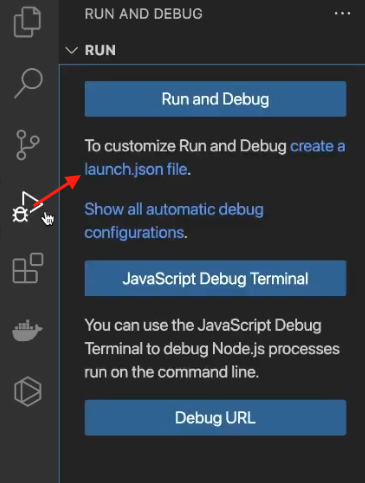
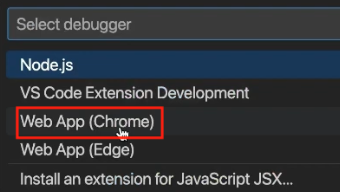
Remove what’s currently in the file.
Go to Next JS’s docs, and copy the launch.js file contents from it.
https://nextjs.org/docs/pages/building-your-application/configuring/debugging
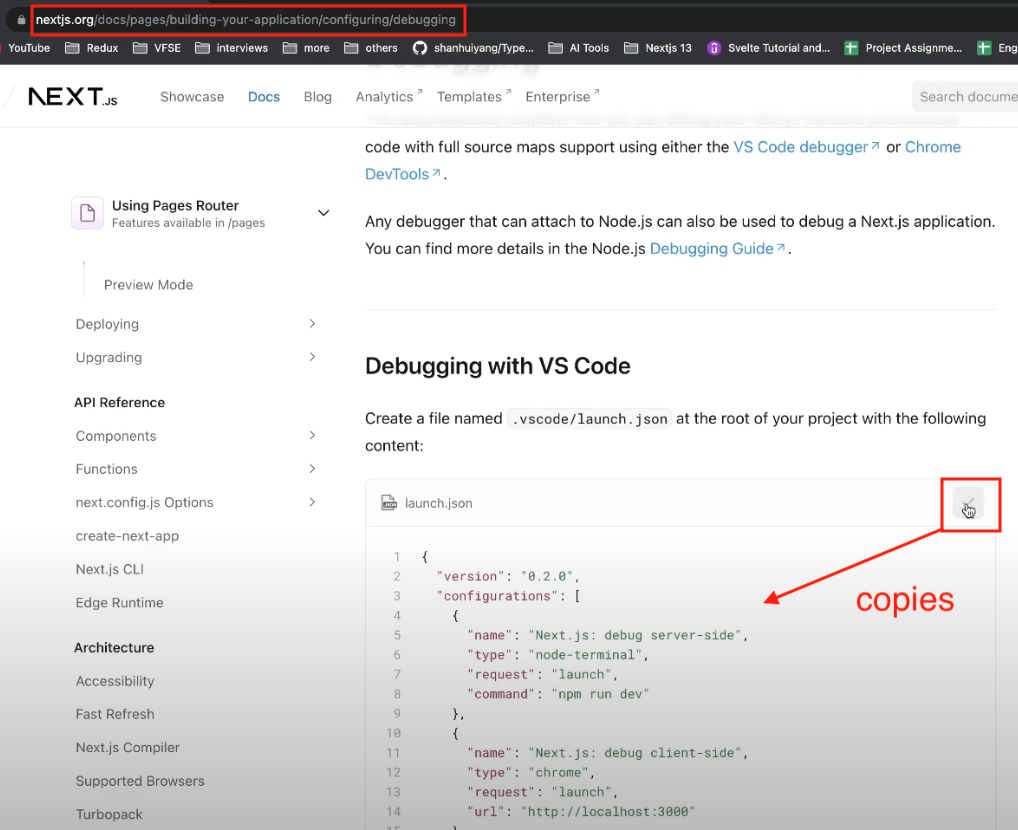
Now, in your root directory it should looks like this:
.vscode/launch.json
|
1 2 3 4 5 6 7 8 9 10 11 12 13 14 15 16 17 18 19 20 21 22 23 24 25 26 27 28 29 |
{ "version": "0.2.0", "configurations": [ { "name": "Next.js: debug server-side", "type": "node-terminal", "request": "launch", "command": "npm run dev" }, { "name": "Next.js: debug client-side", "type": "chrome", "request": "launch", "url": "http://localhost:3000" }, { "name": "Next.js: debug full stack", "type": "node-terminal", "request": "launch", "command": "npm run dev", "serverReadyAction": { "pattern": "started server on .+, url: (https?://.+)", "uriFormat": "%s", "action": "debugWithChrome" } } ] } |
Make sure you click on the debug icon and then select “debug full stack”, which is the 3rd option you put in your launch.json
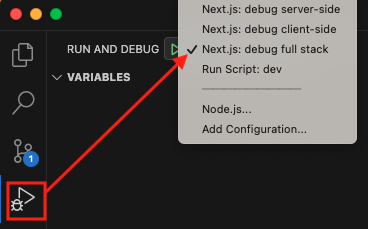
Running the Project
For CLIENT SIDE, Keep in mind that your package.json stays the same:
|
1 2 3 4 5 6 |
"scripts": { "dev": "next dev", "build": "next build", "start": "next start", "lint": "next lint" }, |
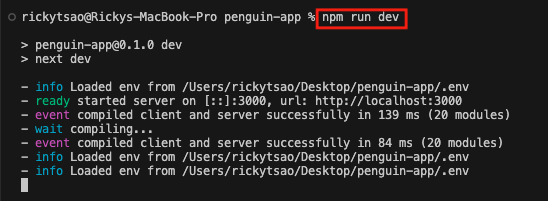
Client side debugging
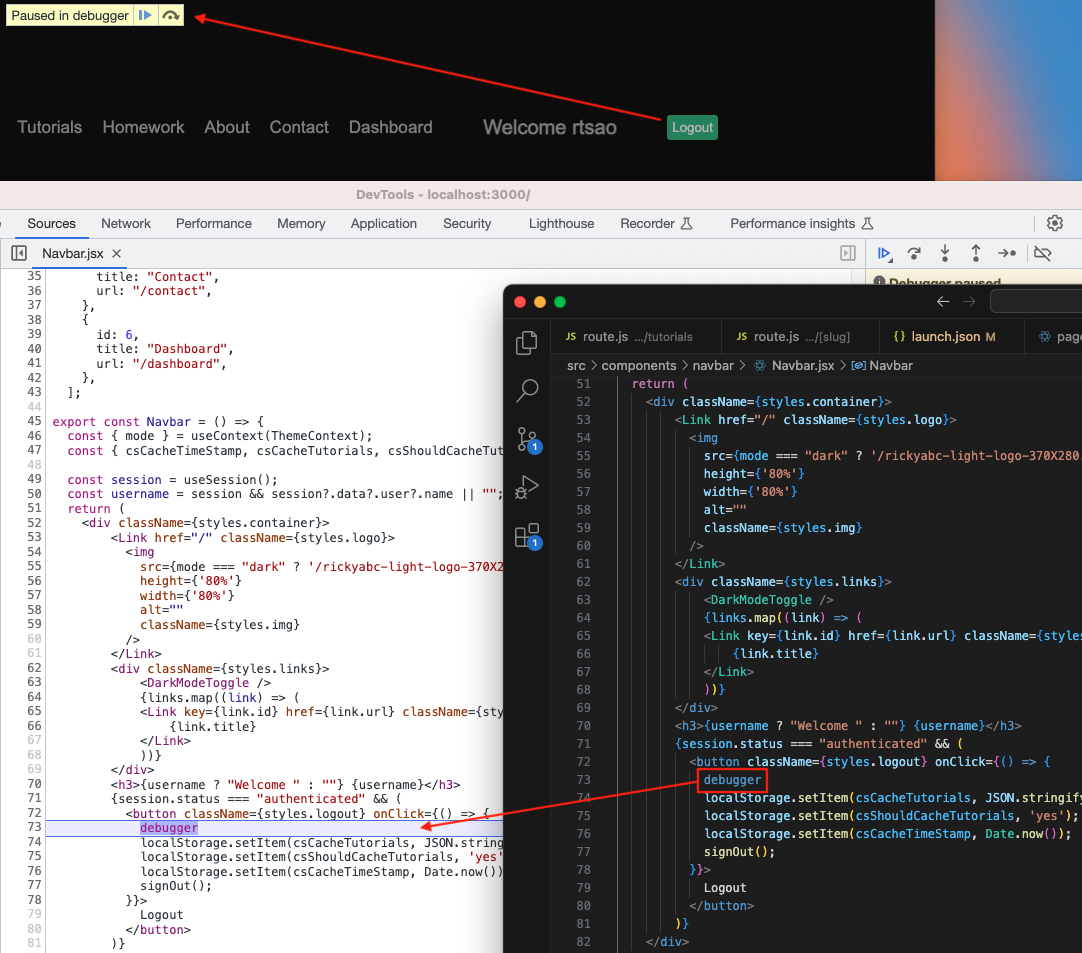
Server Side
Make sure you click the debug icon on the side bar, then click the play button:
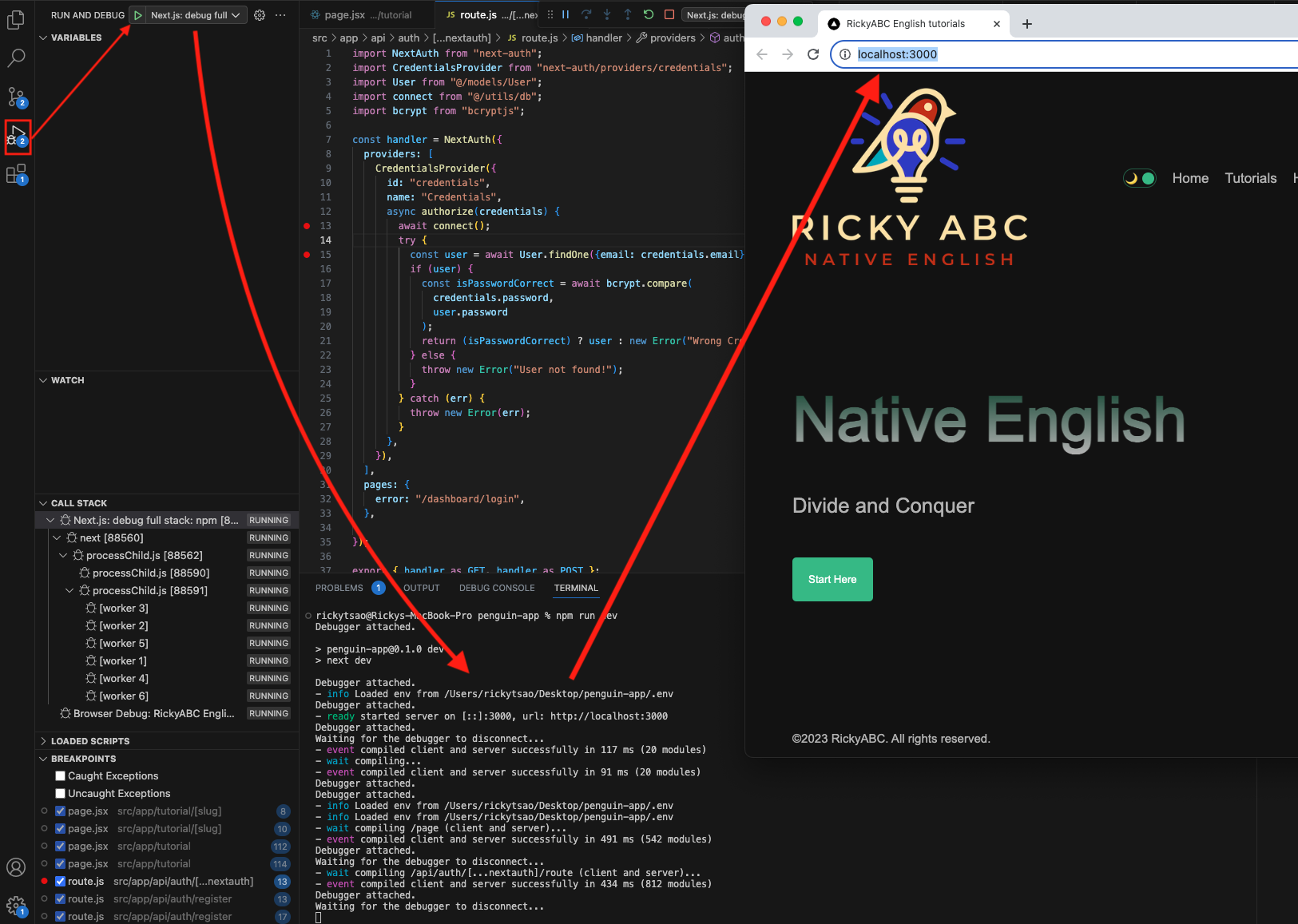
Specifically, like this:

You can use debugger keyword for a breakpoint.
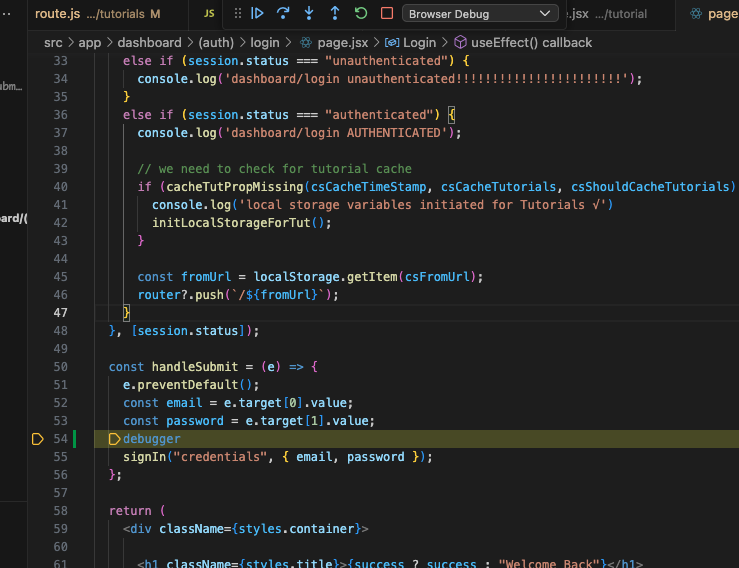
Or you can put standard breakpoints.
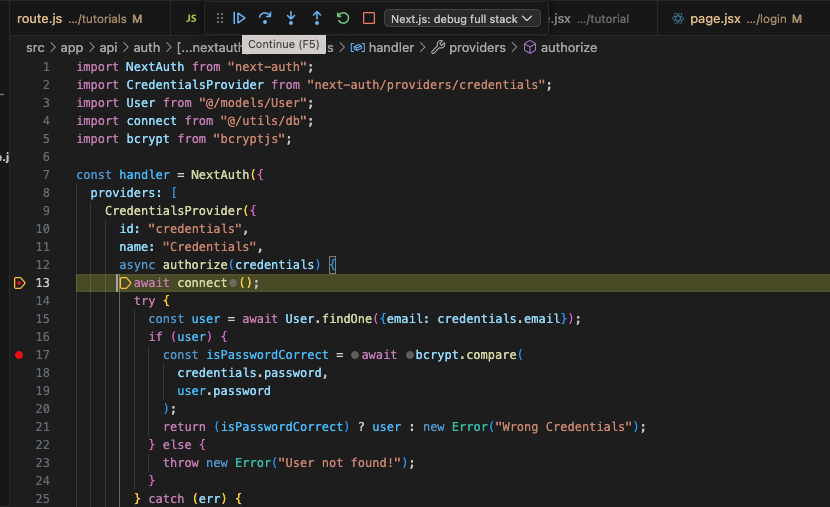
news 9/19
https://www.scmp.com/news/asia/south-asia/article/3233518/will-indias-modi-change-countrys-english-name-rumour-swirl-after-g20-dinner-invites-show-sanskrit
9-14


